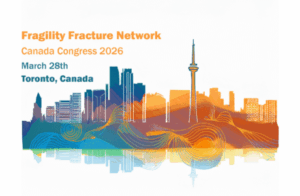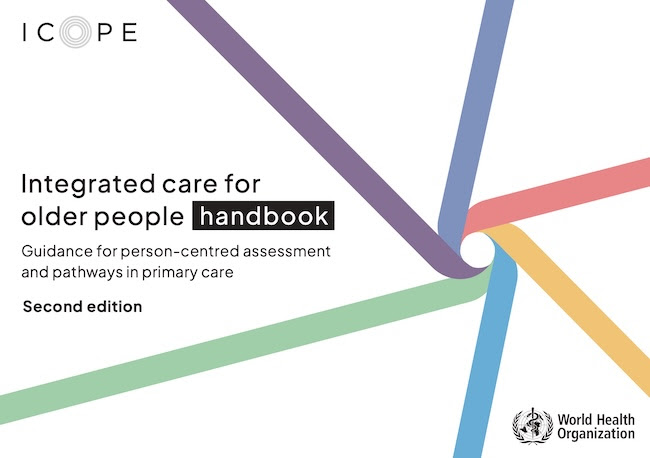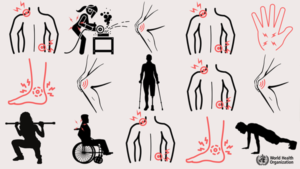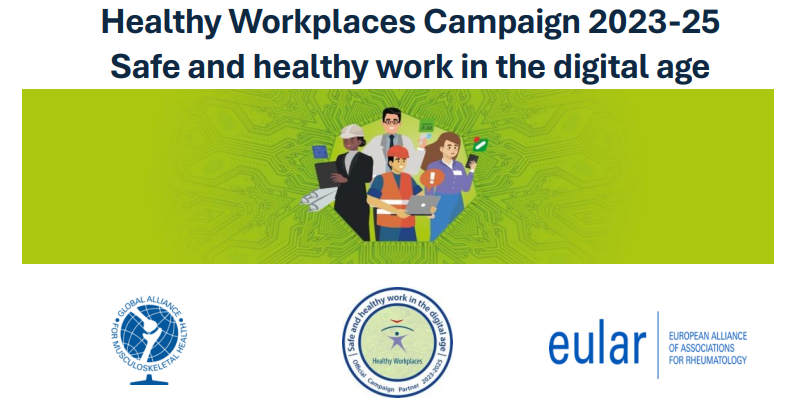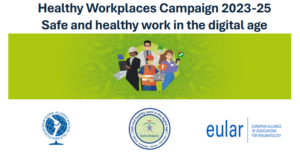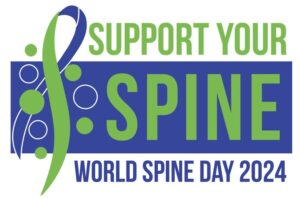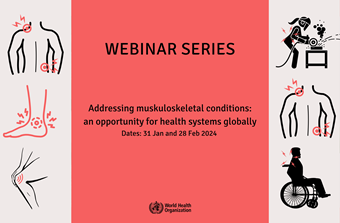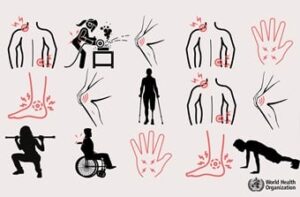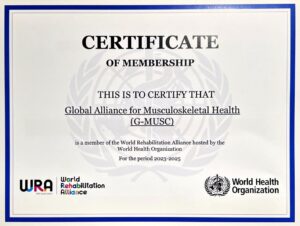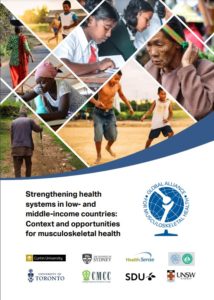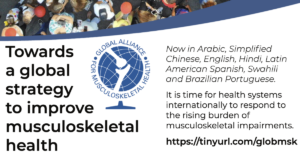Global Alliance for Musculoskeletal Health
Keep People Moving
G-MUSC NEWS
From Fracture to Function: Multidisciplinary Management of Fragility Fractures
The Fragility Fracture Canada Regional Congress is approaching! Dedicated to advancing multidisciplinary care for fragility fractures, the Congress will be held in Toronto, Canada on 28 March 2026
-
The Scientific Program is now available – View the full Scientific Programme
-
Abstract submission deadline is November 30th 2025! – Submit your abstracts and showcase your work to influential researchers, clinicians and decision-makers to help advance knowledge and innovation in care of patients with fragility fractures.
-
Early bird registrations are open until 31 January 2026 – click here for registration details
Click HERE to join the Fragility Fracture Network and for details of upcoming other regional congresses click HERE
August 2025 Newsletter
-
G-MUSC response to political declaration draft
-
GAfPA-G-MUSC Value of Remission roundtable
-
Update from Global Paediatric Task Force
-
Update to paediatric education website and app
-
Japanese translation of health systems strengthening paper
-
MSK Policy and Practice update
-
ICOPE Training Programme (2025)
-
IHME GBD Fellowship
The current version of the draft political declaration has been weakened and still does not recognise musculoskeletal health as a major non-communicable disease
ACT NOW – CONTACT YOUR MINISTRY OF HEALTH
we need a strong, measurable and evidence-based declaration
MSK COMMUNITY NEEDS TO RESPOND
TO POLITICAL DECLARATION OF THE FOURTH HIGH-LEVEL MEETING OF THE UN GENERAL ASSEMBLY ON THE PREVENTION AND CONTROL OF NONCOMMUNICABLE DISEASES AND THE PROMOTION OF MENTAL HEALTH AND WELL-BEING
In advance of the fourth high-level meeting of the UN General Assembly on 25 September 2025 on the prevention and control of noncommunicable diseases and the promotion of mental health and well-being, a draft political declaration has been prepared and consultations are being made with member states. It is also the opportunity for non-state actors / NGOs to respond.
We are very concerned that the zero draft makes no reference to the enormous and growing burden of musculoskeletal conditions.
We need to change this. We need to show the strength of concern by having your support. Below is our response to the zero draft.
We would appreciate all support of this statement to show there is the full weight of the MSK community calling for the inclusion of MSK health as a major NCD. We urge you to also contact ministries in member states to express this concern.
Please let us know if we can add the support of your organisation to this statement and please raise your concerns with policy makers at the national level as it is the member states who vote on this.
RESPONSE OF THE GLOBAL ALLIANCE FOR MUSCULOSKELETAL HEALTH
On behalf of the international musculoskeletal community, the Global Alliance for Musculoskeletal Health are concerned that the Zero Draft of the Political Declaration for the UN High-Level Meeting on NCDs and Mental Health makes no reference to musculoskeletal conditions as one of the major NCDs. We bring together the views of those with lived and learnt experience of musculoskeletal health.
We welcome the ongoing commitment to the challenge of NCDs and mental health but are concerned about the narrow scope in that the Zero Draft omits recognition of the impact of musculoskeletal health conditions which are a leading cause of disability in all countries. The focus remains importantly on preventing premature death, but this ignores the changing global burden of disease from premature mortality to years lived with disability. This will increase with the ageing of populations. The ambition should be to improve healthy life expectancy.
We recommend the explicit recognition in the Declaration of musculoskeletal health and the importance of pain free mobility and function across the life-course as part of an integrated approach to prevention and control of NCDs and to support healthy ageing. This is a unique opportunity to highlight the importance of responding to the burden of musculoskeletal health conditions to improve health and wellbeing (including mental health), related to both musculoskeletal health conditions and other NCDs.
We give the evidence to support this and make specific comments on the Zero Draft in our response.
We would value your support by raising these concerns and recommendations during the consultation processes.
On behalf of the Executive Committee, the Global Alliance for Musculoskeletal Health.
https://gmusc.com/
gmusc.office@gmail.com
Read the full G-MUSC response
The second edition of the ICOPE Handbook launched by WHO
Integrated care for older people handbook: guidance for person-centred assessment and pathways in primary care
Prepared by Yuka Sumi, Rachel Albone and Anshu Banerjee of the World Health Organisation Ageing and Health Unit, Department of Maternal, Newborn, Child & Adolescent Health & Ageing, the work included contributions from WHO staff from regional offices and technical units, along with experts in ageing and health and the care and support of older people.
G-MUSC’s Andrew Briggs and Tony Woolf made contributions to the work.
The ICOPE Handbook provides a resource to support health workers to put recommendations into practice in primary care in the community. The update incorporates the latest WHO recommendations and is informed by experience and learning in different resource settings.
Download the Handbook HERE
Recordings from WHO webinars: Addressing musculoskeletal conditions: an opportunity for health systems globally
Musculoskeletal (MSK) conditions impact individuals globally, contributing significantly to years lived with disability (YLD). The burden extends to health systems, influencing health care costs and rehabilitation needs.
A 2024 webinar series was organised by WHO to initiate early discussions and involve key stakeholders in addressing this critical matter, paving the way for further attention and awareness. Recordings from all webinars are now available at the WHO webinar page HERE
Webinar 1: Global burden of MSK conditions
-
an overview of the global burden of MSK conditions, drawing on findings from the Lancet Rheumatology series to emphasise their worldwide impact
-
covered the global, regional, and national burden of MSK conditions, including specific conditions such as lower back pain, neck pain, osteoarthritis, rheumatoid arthritis, gout, other musculoskeletal conditions, and low bone mineral density
-
the implications of these findings were discussed in detail
Webinar 2: Life-course approach to addressing MSK conditions
-
highlighted strategies for addressing MSK conditions across the life course
-
these strategies included health promotion, prevention, treatment, rehabilitation, and palliation
-
a country-specific perspective was shared, featuring insights from the United Republic of Tanzania’s approach to MSK condition management
Webinar 3: Health promotion and prevention
-
focused on health promotion and prevention, emphasising the importance of physical activity guidelines and their impact on MSK health
-
topics included school health programmes, healthy ageing strategies, and preventive activities for at-risk groups
-
a global strategy for MSK prevention was presented, with practical examples from England (United Kingdom), Japan, and South Africa
-
a patient’s experience demonstrated how promotion and prevention activities facilitated lifestyle changes and improved quality of life
Webinar 4: Treatment and rehabilitation
-
centred on treatment and rehabilitation for people with MSK conditions
-
featured expert insights, country-specific examples from Canada, and patient perspectives, showcasing effective approaches for managing and rehabilitating MSK conditions.
Japanese translation of global health strengthening paper is now available
Back in 2022, G-MUSC’s Andrew Briggs led a team to create the report Towards a Global Strategy to Improve Musculoskeletal Health which has since been translated into seven languages including Arabic, Simplified Chinese, Hindi, Brazilian Portuguese, Latin American Spanish and Swahili. The report provides a roadmap for health systems on “what” can be done to improve musculoskeletal health, and importantly, “how”, across contexts and settings. Read the report here.
Now, with support from the Japanese Association of Chiropractors, Kei Takeyachi in collaboration with Andrew Briggs, led the work to translate the background paper underpinning the report into Japanese. The translated version of the paper is to be published in the Japanese Journal of Chiropractic Science. The paper describes how the priorities and components of the strategic response to guide national-level action on MSK health as discussed in the report were derived.
Read the paper in Japanese here
Briggs AM, Huckel Schneider C, Slater H, et al (2024): 世界的な障害負担を阻止するための 保健制度強化:筋骨格系/ 運動器の健康改善 に向けた世界戦略における優先順位の 高い構成要素の実証的開発(和訳)Japanese Journal of Chiropractic Science
Webinar recording available
Co-ordinated by G-MUSC and EULAR, the recording of the webinar “Musculoskeletal Health in the Digital Age of Work: the good, the bad and the ugly” can be accessed HERE.
The webinar was conducted as part of the Healthy Workplaces campaign 2023-2025: Safe and healthy work in the digital age, and included presentations by G-MUSC’s Tony Woolf and Neil Betteridge. The aim of the webinar was to create a better understanding of how workplaces can take advantage of digitalisation and mitigate the risks.
The webinar included information about:
• how digitalisation can promote and protect MSK health and support people with MSK conditions with personal and organisational case studies.
• the risks to MSK health through sedentary behaviour; increasing risks ie repetitive activities performance managed by an app; and ways it may adversely impact on people with rheumatic and musculoskeletal disorders due to lack of flexibility, and
• the longer term risks of changing how people work and how it needs to be changed to benefit people and society.
WHO webinars: Addressing musculoskeletal conditions: an opportunity for health systems globally
Musculoskeletal (MSK) conditions impact individuals globally, contributing significantly to years lived with disability (YLD). The burden extends to health systems, influencing health care costs and rehabilitation needs.
A webinar series was organized early this year by WHO to initiate early discussions and involve key stakeholders in addressing this critical matter, paving the way for further attention and awareness.
Two more webinars are planned for October and November. For details see the event page
Webinar 3: 21 October 2024, Recording available HERE
Webinar 4: 20 November 2024 Time: 12:00 pm CET
Register: https://who.zoom.us/webinar/register/WN_fzjw1mhQRyG1eunXOjEdLQ
Webinar – Musculoskeletal Health in the Digital Age of Work: the good, the bad, and the ugly
Thursday 31 October 2024 13:00-14:00 CET
Join us for this webinar on musculoskeletal health in the digital age as part of the EU-OSHA 2023-25 campaign.
The Global Alliance for Musculoskeletal Health and EULAR are hosting this webinar for employers, health and safety professionals and for policy makers to highlight the opportunities and the risks that the digital age of work brings to musculoskeletal health – amongst the most common reasons for people to leave the labour market both short and longterm.
See the flyer for the webinar here
To register for this webinar go to: https://lu-se.zoom.us/webinar/register/WN_KK-4oZnhTci2fsAOjY4aUQ
We will consider
• how digitalisation can promote and protect MSK health and support people with MSK conditions with personal and organisational case studies.
• the risks to MSK health through sedentary behaviour; increasing risks ie repetitive activities performance managed by an app; and ways it may adversely impact on people with RMDs due to lack of flexibility.
• the longer term risks of changing how people work and how it needs to be changed to benefit people and society.
The outcome will be a better understanding of how workplaces can take advantage of digitalisation and mitigate the risks.
European Commission – A manual for managing chronic diseases and preventing the risk of acquiring disabilities
This recently released European Commission manual – for managing chronic diseases and preventing the risk of acquiring disabilities – aims to support people who have a chronic disease or a disability at work. It contains practical information and suggestions to improve their working conditions and explain to employers how to make a workplace safer and more inclusive.
In addition to general guidelines, the Manual also features specific guidance for five types of chronic diseases that have a risk of reduced work capacity and that could lead to a disability. They have also been identified by EU-OSHA as priority areas (cf. EU-OSHA 2023a). These are 1) cancer, 2) cardiovascular diseases (CVDs), work-related musculoskeletal disorders (MSDs) and rheumatic and musculoskeletal diseases (RMDs), 4) long COVID and 5) psychosocial risks and stress at work.
Musculoskeletal disorders are addressed in section 5.3 of the manual.
EU-OSHA advises a three-pronged approach to prevent and/or reduce rheumatic and musculoskeletal disorders, including:
a) preventive action and reasonable adjustments to work;
b) effective vocational rehabilitation programmes and co-designed return-to-work plans; and
c) comprehensive support by the employer for workers to self-manage their health condition.
The Manual aims to be a practical, easy to use tool, for all stakeholders to be able to support people with chronic diseases and disabilities to manage their condition in the workplace, return to and remain in work, as well as to prevent further disabilities. It has a focus on providing resources for employers, given their central role as enablers in the management of diseases and disabilities in the workplace.
For employees, the Manual also gives an overview of the rights that exist under EU law when it comes to employment and what the EU is doing to protect and promote employment of people with a chronic disease or disability.
Catalogue number KE-05-24-374-EN-N ISBN 978-92-68-16406-8 DOI 10.2767/321337 © European Union, 2024
Written by Laura Jones and Mathias Maucher, with contributions from Keiu Talve. This document has been prepared for the European Commission, however it reflects the views only of the authors, and the European Commission is not liable for any consequence stemming from the reuse of this publication. © European Union, 2024. Creative Commons Attribution 4.0 International (CC-BY 4.0) licence
October 16
World Spine Care has announced the theme of World Spine Day 2024!
“Support Your Spine”
October 16th marks World Spine Day, an annual event recognised as the largest public health initiative dedicated to raising awareness about the global burden of spinal pain and disability.
World Spine Day brings together individuals from various backgrounds, including health professionals, exercise and rehabilitation experts, public health advocates, schoolchildren, governments, and the wider public. This celebration extends across all continents and emphasises the universal significance of spinal health.
The 2024 initiative urges individuals to spread awareness about the worldwide impact of spinal pain and disability. It aims to empower people of all ages, across all nations to adopt evidence-based strategies for maintaining spinal health under the slogan “Support Your Spine.” The campaign will feature a distinctive two-toned blue and green ribbon, with further details available on the website (https://www.worldspineday.org/).
An estimated one billion people suffer from spinal pain with 540 million people at any one time. Low back pain is the single leading cause of years lived with disability worldwide with neck pain ranking fourth. Experts estimate that as many as 4 out of 5 adults will experience a back problem at some time in their lives.
In numerous low and middle-income countries, conventional healthcare resources and dedicated spinal health professionals are often inaccessible. Consequently, it is essential to prioritise empowering populations and communities to self-manage their conditions. Moreover, the impact of back pain on industries and economies is substantial, even in high-income countries, underscoring the critical importance of effective management and prevention measures.
We call on everyone worldwide to get involved in World Spine Day 2024’s “Support Your Spine” campaign.
To find out more, go to www.worldspineday.org, Facebook, Instagram, Threads and X.
WHO Webinar Series – Addressing musculoskeletal conditions: an opportunity for health systems globally
Background
Musculoskeletal (MSK) conditions impact individuals globally, contributing significantly to years lived with disability (YLD). The burden extends to health systems, influencing health care costs and rehabilitation needs. This webinar series aims to initiate early discussions and involve key stakeholders in addressing this critical matter, paving the way for further attention and awareness.
Objectives
-
To give an overview of the MSK Global Burden series publications as part of launching the Lancet Rheumatology theme issue on global musculoskeletal health.
-
To expand upon our initial webinar insights, formally declare the dates and agenda for the upcoming MSK meeting and foster targeted discussions regarding the strategic progression of the MSK initiative.
Participants – Open to anyone interested in the topic.
Format – Virtual through Zoom
Language – The event will be conducted in English. Closed captioning will be available
Webinar 1: 31 January 2024 from 12:00 to 13:00 CET
Webinar 2: 28 February 2024 from 12:00 to 13:00 CET
Access the recordings of the webinars here
G-MUSC a member of WHO Civil Society Commission
The WHO Civil Society Commission was officially launched by the WHO Director-General Dr Tedros Adhanom Ghebreyesus on 24 August 2023.
We’re pleased to announce that G-MUSC’s application to be part of the Commission has been accepted. We thank our ICC member Dr Manjul Joshipura and the G-MUSC Executive for their work on the application. G-MUSC will be represented on the Commission by Dr Manjul Joshipura and Neil Betteridge, who will be attending the first meeting of the Commission on December 14, 2023.


The mission of the WHO Civil Society Commission is to strengthen dialogue, foster collaboration and provide recommendations to support WHO on its engagement with civil society at global, regional and national levels to achieve health for all and the objectives of the WHO General Programme of Work as well as to accelerate attainment of health-related SDGs.
Its goal is to support WHO’s efforts towards improving engagement between WHO and civil society at global, regional, and national levels, rendering it more systematic with the aim of advancing WHO’s work and public health outcomes. G-MUSC are excited to be part of this.
The initial priorities that were established by the WHO Civil Society Commission Steering Committee include the following:
-
Establishing systems and good governance mechanisms for the WHO Civil Society Commission;
-
Civil Society Engagement in the work of the Commission, particularly through working groups;
-
Contribute to development of a WHO-CSO engagement strategy and implementation of the strategy at country, regional and global levels, in collaboration with WHO;
-
Ensure meaningful CSO engagement on key WHO activities, including the development of WHO’s General Programme of Work #14;
-
Collaboration with WHO at the global, regional, and country levels to enhance mutual understanding of how each entity works and “de-mystify” the role of CSOs in addressing health issues;
-
Meaningfully engage with the WHO Youth Council and other civil society groups to find areas of common interest and alignment.
For more details about the WHO Civil Society Commission see the WHO Civil Society Commission webpages
December 2023 Newsletter
-
WHO launch of guideline for low back pain
-
G-MUSC accepted as a member of WHO Civil Society Commission
-
“It’s about time”: Dissemination and evaluation of the global health systems strengthening roadmap
-
Meeting one of our patient collaborators – Maranda Van Dam
-
G-MUSC members attend launch of World Rehabilitation Alliance
-
WHO Health for All Film Festival – call for short films on rehabilitation
-
G-MUSC official campaign partner of the European Agency for Safety and Health at Work MSK campaign Safe and healthy work in the digital age 2023-2025
-
Global burden of osteoarthritis is increasing
-
G-MUSC Task Forces
G-MUSC now a member of World Rehabilitation Alliance
The Global Alliance for Musculoskeletal Health (G-MUSC) are pleased to announce that we have been accepted to join the World Rehabilitation Alliance (WRA). The WRA is a WHO global network of stakeholders whose mission is to support the implementation of the Rehabilitation 2030 Initiative through advocacy activities. It focuses on promoting rehabilitation as an essential health service that is integral to Universal Health Coverage and to the realization of Sustainable Development Goal 3 Ensure healthy lives and promote well-being for all at all ages.
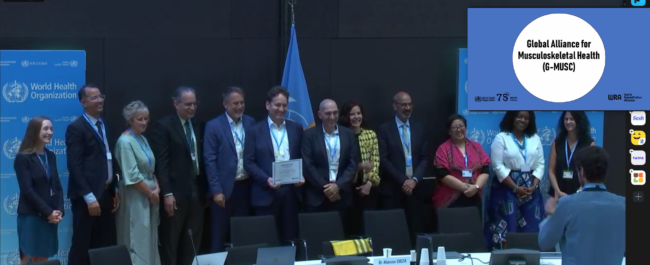
G-MUSC Newsletter – May 2023
-
G-MUSC a member of World Rehabilitation Alliance
-
WHA historic resolution on strengthening rehabilitation in health systems
-
Global burden of low back pain is increasing
-
Global Strategy to Improve Musculoskeletal Health report – available in 7 languages
-
Towards healthy populations: a need to strengthen systems for musculoskeletal health
-
Responding to the global burden of musculoskeletal health impairment
-
Strengthening health systems in low- and middle- income countries
-
Neil Betteridge presents at ASIF meeting
-
G-MUSC patient collaborators
-
G-MUSC official campaign partner of the European Agency for Safety and Health at Work MSK campaign
-
ARMA Annual Lecture 2023 – Community-powered MSK
-
IFMRS Education in MSK Research
-
Every Step Matters – hospital inpatient education video
Strengthening health systems for musculoskeletal health in low and middle-income countries
The burden of disease attributed to musculoskeletal (MSK) conditions disproportionately affects people in low– and middle–income counties (LMICs).
Data from nine LMICs (Argentina, Bangladesh, Brazil, Ethiopia, India, Kenya, Malaysia, Philippines and South Africa) included in the GMUSC global strategy report were re-evaluated to identify priorities and opportunities for health systems strengthening for MSK health in LMICs. The international research team undertook secondary analysis of qualitative data to specifically interrogate themes relevant to context and priorities for MSK health system reform in LMICs and coupled these data with analysis of health polices for integrated management of non-communicable diseases.
The findings of that work are presented in this report, accompanied by a research paper published in the journal Health Policy and Planning.
In 2021 the report, Towards A Global Strategy To Improve Musculoskeletal Health was published by the Global Alliance for Musculoskeletal Health (G-MUSC). It outlines a roadmap for health systems internationally on ‘what’ can be done to improve musculoskeletal health and rheumatic diseases, and importantly ‘how’, across contexts and settings. The roadmap was co-designed by the global community, comprising 678 individuals and 116 organisations from 72 countries. Originally published in English, the report has now been translated into Arabic, Simplified Chinese, Hindi, Brazilian Portuguese, Latin American Spanish and Swahili.
Access the translated reports here. Please respond to the 5min survey to share your thoughts on the value of these products.

The Paediatric Task Force has support from the Paediatric Rheumatology European Society (PReS) to disseminate the e-Newsletter further to the extended PReS community. This is great news as the Task Force will be able to reach many new audiences as the PReS list is currently 10,000+. If you are not on the PReS list already, in order to continue to receive the Paediatric Task Force e-Newsletters in the future please sign up to the PReS mailing list. Please note that being on this list is free, not just for the paediatric rheumatology community and has appropriate governance around data protection
For further details, see the PReS website
G-MUSC Newsletter – April 2022
- GMUSC Annual General Meeting report
- Neil Betteridge joins GMUSC Executive
- New interim members of GMUSC International Coordinating Council
- Looking back, looking forward – Prof Helen Foster, Paediatric Task Force
- New Health Professional Competency Framework from the WHO – update from GMUSC Education Task Force
- Translation of Framework for health systems strengthening into 6 languages
- Bone and Joint Japan celebrates 20th Anniversary
- Bone and Joint Japan 10th National Competition Award Ceremony
- WHO framework for countries to achieve an integrated continuum of long-term care
- EU-OSHA – Musculoskeletal conditions in the workplace
- UK ARMA – Report on musculoskeletal health equalities
G-MUSC Newsletter – October 2021
- Towards a global strategy to improve musculoskeletal health across the lifecourse
- Bone and Joint Action Week – 12-20 October
- COVID-19 and Rheumatic Disease resources
- Global rehabilitation – side event at United Nations High Level Political Forum
- Report from Paediatric Task Force
- Update from Bone and Joint Japan
- EULAR consensus on prevention trials in people at risk of developing RA
- Upcoming meetings
- Public Health England Musculoskeletal Updat

